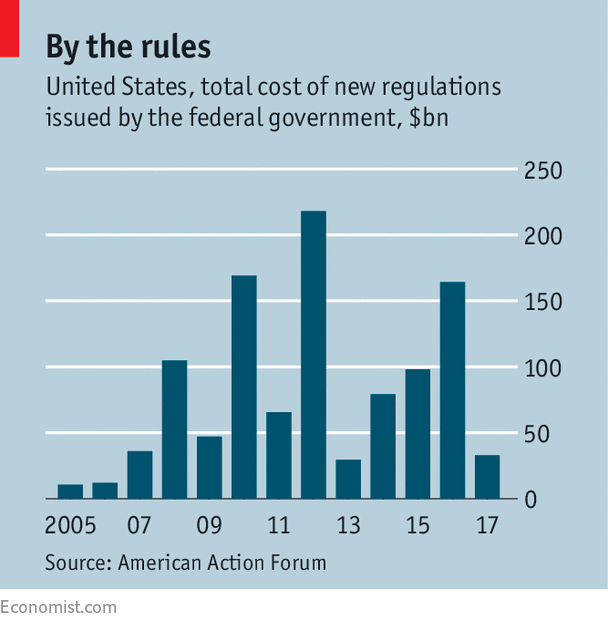IN CORPORATE America, “Trump” seems to be a dirty word, at least in public. After President Donald Trump seemed to equate the actions of white supremacists and their opponents in Charlottesville earlier this month, dozens of chief executives abandoned his advisory councils. Several organisations cancelled fundraising galas booked at Mr Trump’s Mar-a-Lago resort in Florida. Lloyd Blankfein, the boss of Goldman Sachs, an investment bank, compared Mr Trump to the dark shadow cast over parts of America by a solar eclipse: “We got through one, we’ll get through the other.”
Look past the public repudiation, though, and the schism is less stark. As Jason Furman of Harvard University’s Kennedy School, who led the White House Council of Economic Advisers during Barack Obama’s presidency, points out, the bosses’ public rejection of Mr Trump has done nothing to sap their appetite to guide policy. Lower-ranking executives from large firms continue to serve on informal working groups to help the Treasury and the Commerce Department with deregulation. Others are advising on trade policy, trying to steer the administration away from its protectionist impulses.
-
Migration to Britain is falling
-
Retail sales, producer prices, wages and exchange rates
-
How America botches executions using lethal injections
-
How hip-hop is introducing children to coding and technology
-
Foreign reserves
-
Why Roger Taney’s statue was removed from Maryland’s state house
An insider at a trade association representing big business waves the Charlottesville furore aside, declaring: “The hard work of policymaking in Washington must continue.” One chief executive who left a White House advisory council explains that firms are still keen to work with the administration, albeit quietly: “Executive action will continue, so corporate working groups will continue.”
They have already made progress. Under Mr Obama, the cost of new federal rules issued each year grew significantly from the levels of George W. Bush’s presidency, according to the American Action Forum, a conservative think-tank (see chart). The early months of the Trump era have already seen that trend reverse.

But the big prize for firms remains tax reform. The chances of that are hurt by Mr Trump’s divisiveness, the Republicans’ slim majority in Congress, and by the need for tricky negotiations over funding the government and raising the debt ceiling, which will delay debate on taxes. Yet many business leaders still reckon that this is the best chance at tax reform since the sweeping Reagan-era overhaul of 1986.
That is enough for some executives to stay close to the administration. “The president is not ultimately that powerful,” says another boss who left a White House advisory council. “Things get done in the Cabinet departments and various agencies.” Such optimism may be misplaced, according to William Galston of the Brookings Institution, a centre-left think-tank. “Business interest in reform is not diminished,” he says, “but the ability of the White House to get its way is diminished.”
Source: economist
American bosses continue to lobby, more quietly